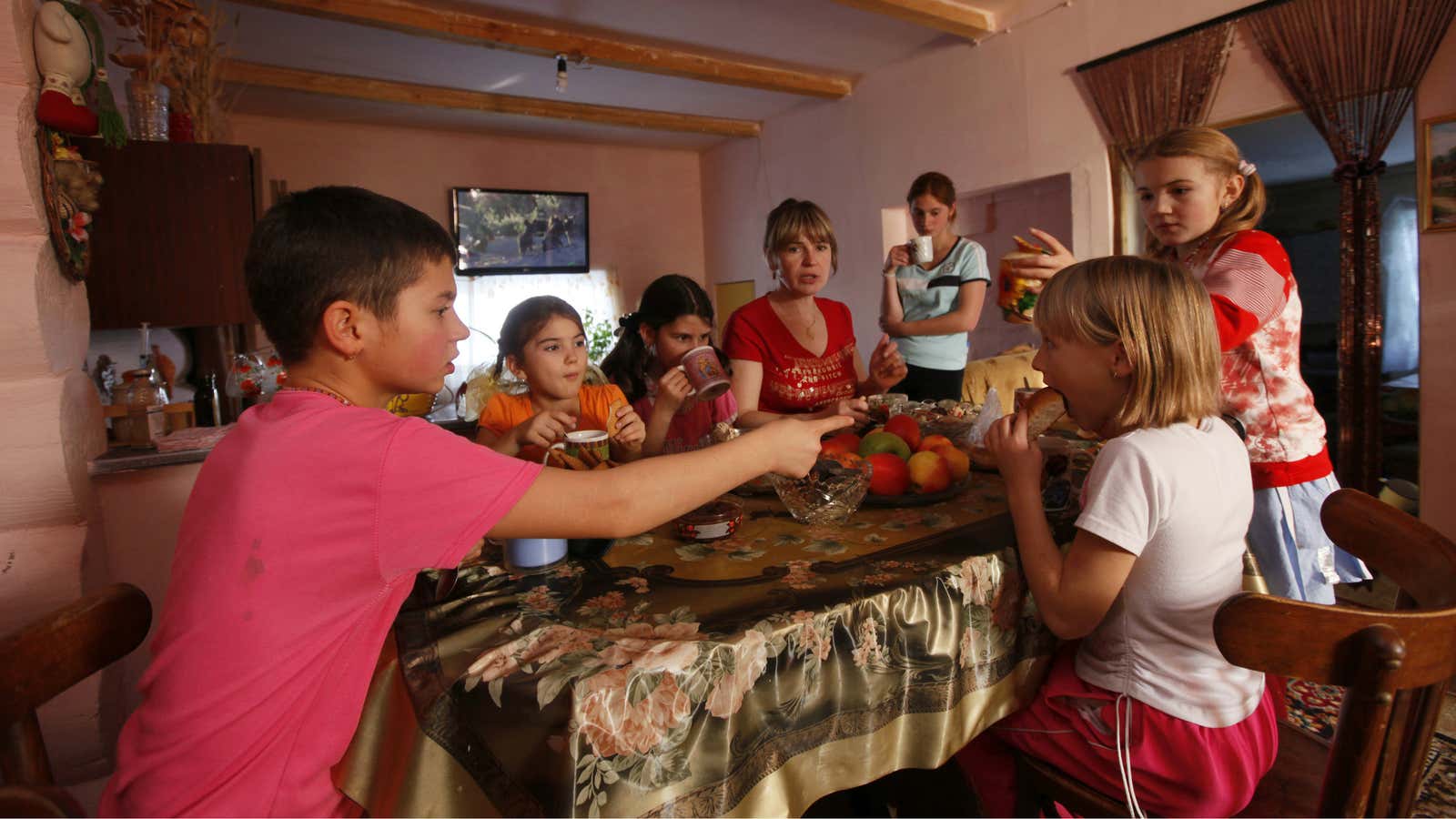Striking up a fruitful conversation with your child about their day can feel like a walk in the dark. But a mountain of evidence suggests that the place where these conversations tend to happen, at the family dinner table, is critical to raising a happy and healthy child. (A recent OECD report found that, around the globe, kids whose parents spend time talking to them and eating family dinners were more satisfied with life and more performed better in science.)
Once we’ve accomplished getting everyone around the table—for that blissful 45 seconds before someone needs ketchup, or water, or napkins to mop up a spill—even the savviest conversationalists can grapple with what to say.
That’s partly because, as parents, we aren’t just looking to shoot the breeze. We want a conversation that keeps our kids at the table, but also builds great life skills, from casual discourse to critical thinking. We want to challenge them and get them to challenge us, thinking creatively about how they approach things and not just in the “right” or “wrong” way schools sometimes approach things. We want them to embrace failure so they are not afraid of trying.
Here are some ideas for reaching that higher ground. A few are my own; the rest are gleaned from a writeup by Jane Dimyan Ehrenfeld, director for the Center for Inspired Teaching, who works with teachers “to change school from a place that prizes compliance to a place that promotes authentic engagement.”
What made you mad, sad, or glad?
A popular game in my family is “mad, glad, sad.” What happened today that made you mad, or glad, or sad, or all of the above? It’s an opportunity to glean whether there are any conflicts brewing and what at school brings your child joy. This is particularly helpful for parents who are not around for school pick-ups, when the usual download on school takes place.
What was your favorite mistake?
“My favorite mistake,” according to Ehrenfeld, involves taking turns to highlight something each person did wrong during the day and how they tried to fix it. The beauty of this game is in parents taking a turn, because children love learning about how parents fail. When I first did this with my kids, they were floored to hear the litany of mistakes my husband and I make in the course of a day. I was late to a meeting; I apologized in person, and then later by email, acknowledging the person was very busy. I wrote a story that didn’t pan out, so we scrapped it. “YOU THREW IT AWAY?” bellowed my eight-year-old. I used a sharp tone with their grandmother, in a debate about Donald Trump. “I didn’t need to do that; I think I can do better,” I said (maybe I can’t, but at least I should try).
Not only does the exercise demonstrate that parents can make and admit to mistakes, Ehrenfeld writes, it also sends the message that “you’ve never done anything so terrible you can’t share it with your parents —a message I hope will stay strong through their teenage and adult years.”
What is your question of the day?
Occasionally someone in Ehrenfeld’s family poses a “question of the day” and everyone has to take turns responding. The questions that have come up in her family include, “If you could fly, where would you go first?” and “If you could build any kind of house for yourself, what would it look like?” Her five-year-old came up with this one: “If you were on a skateboard and you were a tree, what color would you be?” It triggers boundless creativity, and draws out all those strange and intriguing connections kids tend to make.
What happened that you want to remember and celebrate?
Her last suggestion, which her husband came up with, is an opportunity for reflection. The benefits of the question are two-fold: acknowledging what is worth remembering, and giving thanks for the bounty of blessings many of us enjoy.
The power of gratitude fosters contentment, but also healing, as Sheryl Sandberg notes in her new book, Option B: Facing Adversity, Building Resilience and Finding Joy. In the depth of her grief over losing her husband, the exercise of trying to find things to be thankful for helped her overcome the darkness of deep sadness and rediscover small moments of joy. She and her children talk about something they are thankful for every night.
What is something you did today to help someone else?
I stole this gem of a question from a friend. It is a simple, straightforward reminder to your children that they have the power to help others every day. And if you’re hungry for more, check out the treasure trove of conversation starters by age at The Family Dinner Project.
